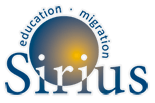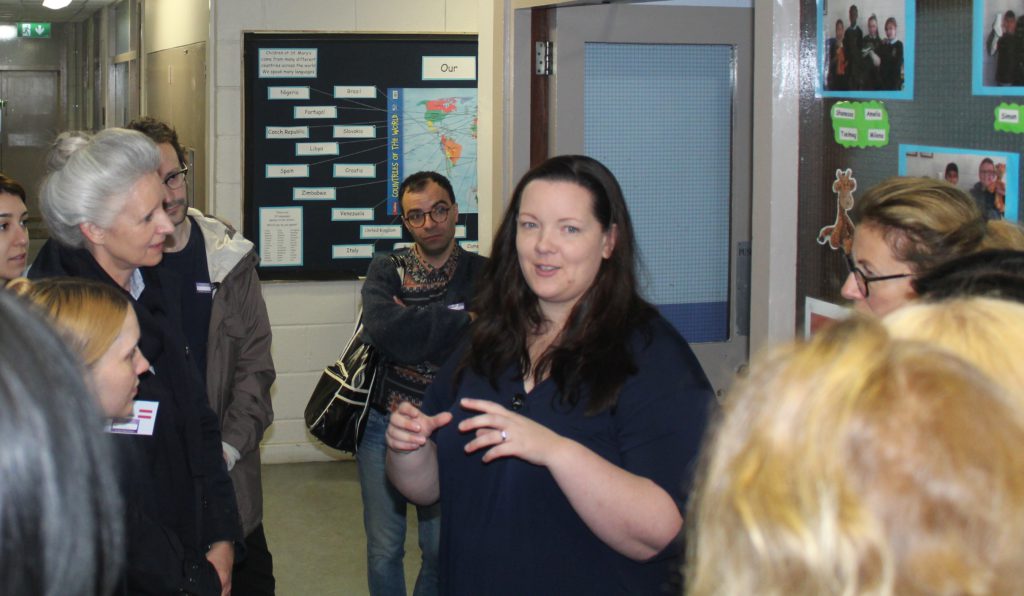DELIVERING EQUALITY OF OPPORTUNITY IN SCHOOLS (DEIS) AND HOME SCHOOL COMMUNITY LIAISON SCHEME (HCLS)
The Peer Learning Activity in Dublin (Ireland) focused on two programmes delivered by Ireland’s Department of Education and Skills. These are the DEIS programme and the Home School Community Liaison Scheme. SIRIUS’ delegation also gained knowledge on the Separated Children’s Service, a service provided by the Department of Education and Skills and the Department of Children and Youth Affairs, which it visited on the second day. Moreover, a visit to St Mary’s primary school, a DEIS school with a population that reflects the rich diversity of families in their local area, has been organised too on the second day.
The PLA was hosted by the New Communities Partnership (NCP), Ireland’s leading and only umbrella network for migrant-led organisations. Formed in 2003 by a group of community leaders who wished to empower and represent migrant voices in Ireland, the organisation has grown to be an independent national network of more than 150 immigrant-led groups comprising 65 nationalities with offices in Dublin and Cork with outreach to other cities. NCP Youth programme is dedicated to working with children and young people of migrant descent to ensure positive learning outcomes in all facets of their education.
DEIS Programme
Delivering Equality of Opportunity in Schools (DEIS), the Action Plan for Educational Inclusion, is a programme that was launched in May 2005 by the Department of Education and Skills. As of 2019, it remains the Department’s policy instrument to address educational disadvantage. DEIS provides for a standardized system for identifying levels of disadvantage and an integrated School Support Programme (SSP). The Action Plan focuses on addressing and prioritizing the educational needs of children and young people from disadvantaged communities, from pre-school through second-level education (3 to 18 years). The determining of the DEIS schools is based on specific criteria. The data for the specific criteria is received from the national data bases, e.g. the data of the population and the data of the people’s health.
Key targets of the DEIS programme is to increase:
- literacy and numeracy;
- retention rates;
- wellbeing;
- progression to further and higher education by under-represented groups;
- access by under-represented groups to initial teacher education;
- parental engagement.
DEIS Schools, as all schools in Ireland, are obliged to construct a three-year School Development Plan. Professional support for the development of the Plan is provided by the Department upon request of the schools. A DEIS-inspector is appointed to each school to further advise and support schools on the implementation of the Plan. The Plan should cover the following five key goals:
- To implement a more robust and responsive Assessment Framework for identification of Schools and effective resource allocation;
- To improve the learning experience and outcomes of pupils in DEIS schools;
- To improve the capacity of school leaders and teachers to engage, plan and deploy resources to their best advantage. Each school in DEIS program must develop and implement a three years improvement plan “Smart”: specific, measurable, attainable, relevant, time based;
- To Support and Foster Best Practice in Schools through Inter-Agency Collaboration;
- To support the work of schools by providing the research, information, evaluation and feedback to achieve the goals of the Plan.
In total, 825 schools were included in the programme in the years 2016-2017. These comprised of 640 primary schools (328 urban/town schools and 312 rural primary schools) and 185 second level schools.
Home School Community Liaison Scheme
The Home School Community Liaison (HSCL) Scheme is a central component of the Department of Education and Skill’s DEIS programme and action plan. The underlying vision and thrust of the HSCL Scheme is preventative; therefore, it seeks to promote and develop real partnership between parents, teachers and communities, in order to enhance pupils’ outcomes and learning opportunities, through improved attendance, participation and retention in the education system.
The main goal of HSCL is to ensure transition and literacy (of students) and keep the partnership with parents and the community. The central element of this scheme is to involve the parents to school life, to communicate with them, to inform and empower them so that they could support their children. The activities involve informal meetings (example: “morning coffees”), courses for parents (example: conversation classes, languages and cooking courses), parents visiting students’ lessons e.g.
The most important keywords in this approach are individual approach and tailor-made, evidence-based interventions. The implementing of this scheme within the context of the DEIS programme is the responsibility of the HSCL Coordinator who works in every school that implements the HSCL. Only permanent school staff is eligible to apply for a five-year HSCL coordinator term. After the term ends, the coordinator must go back to regular teaching for the reason that the good knowledge the coordinator has developed needs to be disseminated not only within their profession but also for colleagues at school.
Separated Children’s Service
The Separated Children’s Service is an Education and Youth Support Service for young people from refugee and migrant backgrounds. The service provides opportunities and resources for young people to realise their fullest potential, to negotiate and navigate their new environment and life in Ireland, and to integrate into and contribute to Irish society. The service is funded by the Department of Education and Skills and the Department of Children and Youth Affairs (DCYA). In 2016 the service also received a youth employability grant from the Dormant Accounts Fund through DCYA. The Service is managed through the City of Dublin Education and Training Board (CDETB)’s Curriculum Development Unit (CDU) and supported by the City of Dublin Youth Service Board (CDYSB).
St. Mary’s Primary School
St. Mary’s Primary School is a Catholic school in Dublin for children age 4-12 years living in close proximity to the school. The school has 240 children of which 88% of them has English as a second/additional language. In total, the school inhabits 39 different native languages.
The school follows the national DEIS progamme for disadvantaged schools since majority of the pupils’ parents have immigrated to Ireland, are newly arrived migrants themselves. A majority of the pupils at St. Mary’s have a migrant background or are living in other vulnerable and isolated living conditions e.g. homelessness. The aim of this school is to provide happy and stimulating learning experiences in a safe, secure and supportive environment, taking into account the social, physical, emotional, creative and spiritual well-being of each child, at the same time cultivating good habits, respect for each other, for the school and the environment.


